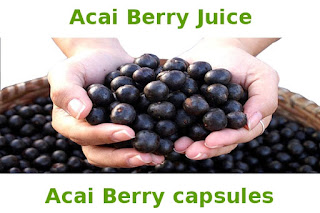Acai Berry Juice versus Acai Berry capsules
Should you drink Acai Berry Juice or should you take Acai Berry capsules. This is a debate that has many people going round and round with one another. But first, it is important to understand why there is a debate by looking at what Acai Berry does.
Here is a list of how Acai Berry can help you have a healthier body:
Acai Berry (Euterpe oleracea fruit) - http://eco-supplements.com/acai-berry-euterpe-oleracea-fruit/.
All of these are great benefits to this simple little berry.
Also, pure Acai juice is unchanged, whereas the pill goes through a complex process that does change it. The pill is basically a quick way to receive some of the benefits of the Acai Berry without having to drink the juice or eat the berry. However, for those wishing to have the juice straight, choosing the juice may be the right option.
Here is a list of how Acai Berry can help you have a healthier body:
- Due to the rich antibiotics and Omega 3 and Omega 9 fatty acids, as well as other ingredients, the berry is known to fight many serious diseases.
- Immunity is increased because toxins are flushed from the blood stream.
- The body receives instant energy that can help you make it through your day.
Acai Berry (Euterpe oleracea fruit) - http://eco-supplements.com/acai-berry-euterpe-oleracea-fruit/.
All of these are great benefits to this simple little berry.
The juice versus the capsule
As for the debate regarding whether the juice or the capsule is better, it is good to review the similarities. The first similarity is the fact that both the juice and the pills come from the Acai Berry. Both also go through processes before they make it to you. The truth, however, is that the juice offers more flexibility. There are different beverages that contain Acai Berry and the juice can also be combined with others for unique flavors.Also, pure Acai juice is unchanged, whereas the pill goes through a complex process that does change it. The pill is basically a quick way to receive some of the benefits of the Acai Berry without having to drink the juice or eat the berry. However, for those wishing to have the juice straight, choosing the juice may be the right option.
Personal preference
In the end, what you do depends on personal preference. If you do not want the juice, then you most likely will not choose the juice, but understand the benefits that you receive by having it. Basically, both have their pros and cons as you can see.Copywrite
This is an open access article distributed under the Creative Commons Attribution License, which permits unrestricted use, distribution, and reproduction in any medium, provided the original work is properly cited.References & External links
- Jensen, Gitte S., et al. "Pain Reduction and Improvement in Range of Motion After Daily Consumption of an Açai (Euterpe oleracea Mart.) Pulp–Fortified Polyphenolic-Rich Fruit and Berry Juice Blend." Journal of medicinal food 14.7-8 (2011): 702-711.
- Jensen, Gitte S., et al. "In vitro and in vivo antioxidant and anti-inflammatory capacities of an antioxidant-rich fruit and berry juice blend. Results of a pilot and randomized, double-blinded, placebo-controlled, crossover study." Journal of agricultural and food chemistry 56.18 (2008): 8326-8333.
- Mertens-Talcott, Susanne U., et al. "Pharmacokinetics of anthocyanins and antioxidant effects after the consumption of anthocyanin-rich acai juice and pulp (Euterpe oleracea Mart.) in human healthy volunteers." Journal of agricultural and food chemistry 56.17 (2008): 7796-7802.
- Heinrich, Michael, Tasleem Dhanji, and Ivan Casselman. "Açai (Euterpe oleracea Mart.)—A phytochemical and pharmacological assessment of the species’ health claims." Phytochemistry Letters 4.1 (2011): 10-21.
- Udani, Jay K., et al. "Effects of Acai (Euterpe oleracea Mart.) berry preparation on metabolic parameters in a healthy overweight population: a pilot study." Nutrition journal 10.1 (2011): 45.
- Basu, Arpita, Michael Rhone, and Timothy J. Lyons. "Berries: emerging impact on cardiovascular health." Nutrition reviews 68.3 (2010): 168-177. "Berries are a good source of polyphenols, especially anthocyanins, micronutrients, and fiber. In epidemiological and clinical studies, these constituents have been associated with improved cardiovascular risk profiles. Human intervention studies using chokeberries, cranberries, blueberries, and strawberries (either fresh, or as juice, or freeze-dried), or purified anthocyanin extracts have demonstrated significant improvements in LDL oxidation, lipid peroxidation, total plasma antioxidant capacity, dyslipidemia, and glucose metabolism. Benefits were seen in healthy subjects and in those with existing metabolic risk factors. Underlying mechanisms for these beneficial effects are believed to include upregulation of endothelial nitric oxide synthase, decreased activities of carbohydrate digestive enzymes, decreased oxidative stress, and inhibition of inflammatory gene expression and foam cell formation. Though limited, these data support the recommendation of berries as an essential fruit group in a heart-healthy diet."

